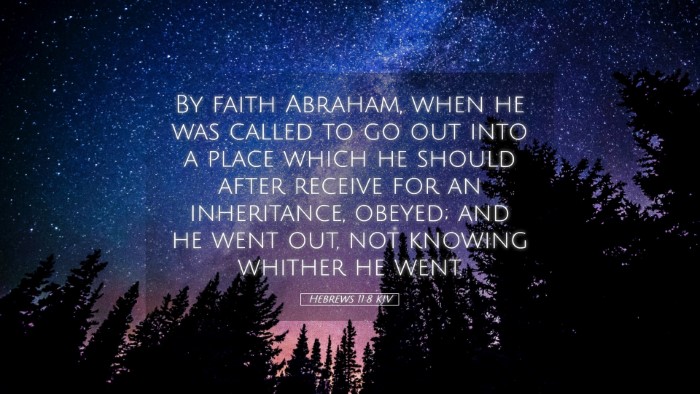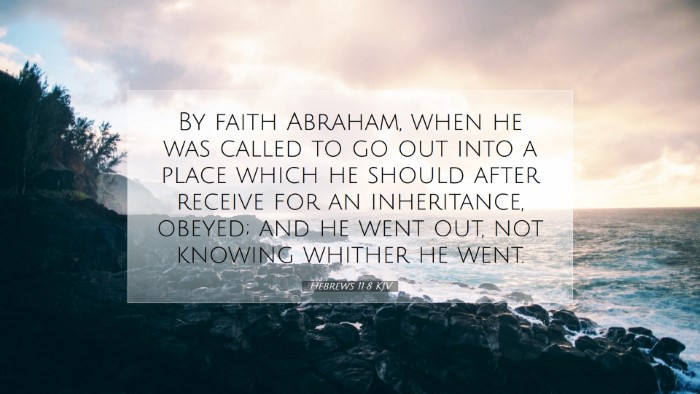Commentary on Hebrews 11:8
Verse: "By faith Abraham, when he was called to go out into a place which he should after receive for an inheritance, obeyed; and he went out, not knowing whither he went."
Introduction
This verse from the Book of Hebrews is a profound testimony of faith, exemplifying Abraham's responsive obedience to God's call. It holds significant theological implications regarding faith, obedience, divine guidance, and the nature of God's promises. Various public domain commentaries provide a rich tapestry of insights into this single verse, all of which deepen our understanding of Abraham’s faith journey and its relevance for contemporary believers.
Contextual Background
Hebrews 11, often referred to as the "Faith Hall of Fame," highlights various biblical figures renowned for their faith. In the case of Abraham, the author emphasizes his obedience and faith as foundational elements of his relationship with God, setting an encouraging precedent for readers, especially those facing challenges of faith.
Insights from Matthew Henry
Obedience to Divine Call: Matthew Henry emphasizes that Abraham's faith manifested itself in action. His readiness to leave his homeland signifies a profound trust in God's promise, which was to lead him to a land of inheritance—indicating both physical and spiritual significance.
Leaving the Familiar: Abraham's departure from Ur of the Chaldeans showcases a decisive act of faith. Henry articulates that this act also reflects a broader spiritual truth regarding the necessity of leaving behind worldly security in pursuit of God's plans.
Insights from Albert Barnes
Faith in the Unknown: Barnes remarks on the aspect of Abraham's journey being characterized by an unknowingness. Despite not knowing his destination, Abraham obeyed God’s call, illustrating a model of faith that encompasses uncertainty—a vital lesson for modern believers facing unknown paths.
Inheritance of Promises: Barnes highlights that Abraham's faith secured him an inheritance, emphasizing that though physical land was at stake, there was also a larger dimension of spiritual inheritance tied to his faithfulness. This speaks to the Christian's calling to see beyond the immediate and the temporal.
Insights from Adam Clarke
The Nature of Faith: Adam Clarke delves into the nature of faith as described in this passage. He identifies Abraham’s faith as a decision of the will to trust God, demonstrating that faith is not merely intellectual assent but a dynamic force that propels one into action.
Spiritual Application: Clarke also speaks to the principle that when God calls, there is often a necessity to forsake what is familiar. This aspect of Abraham’s faith serves as a lesson to believers of all ages: commitment to God's calling may sometimes require significant personal sacrifice.
Theological Implications
- Faith and Action: The commentary collectively stresses that true faith manifests itself through obedience. Abraham's actions exemplify that faith always encourages movement—a forward thrust into God’s purposes.
- Uncertainty and Confidence: As noted by both Barnes and Clarke, believers are often called to navigate through uncertainty, underscoring the necessity of anchoring one's trust in God's promises instead of understandable outcomes.
- Divine Guidance: The passage reflects a broader biblical truth: God calls individuals into specific purposes that often transcend human understanding and expectation.
Application for Pastors and Theologians
This verse serves as a pivotal reference when teaching about the nature of faith. It challenges congregants to evaluate their own responses to God’s call, urging them to consider the places of comfort they may need to leave for the sake of obedience.
For theologians, exploring the multifaceted nature of faith as illustrated through Abraham presents an opportunity to analyze the dynamic relationship between divine sovereignty, human responsibility, and the implications of faith metrics within the broader narrative of Scripture.
Conclusion
Hebrews 11:8 captures a critical moment of faith that resonates deeply through the ages. It challenges believers to recognize that God's call often comes with demands that require a willing spirit—a readiness to step into the unknown with trust in God’s faithfulness. As pastors, scholars, and students delve into this rich text, the timeless lessons of Abraham’s faith continue to inform and inspire a life that honors God through obedience.


